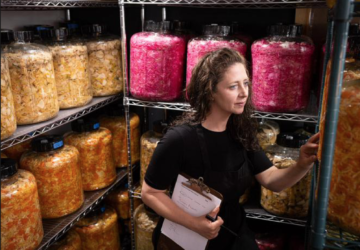Five Questions with Alison Bernstein, Founder of Suburban Jungle
Chloe Cornell
The decision of where to live and raise your family is fraught with unknowns. There are so many factors to consider such as, should I live in a city or a suburb? If the answer is suburb, the next question is which one? Where? And how can someone distinguish between the many options as each community has their own personality and culture which is near impossible to discover unless you have close friends living there or if you live there for a while. Alison Bernstein recognized this major hole in the real estate industry when she and her husband began their search to relocate out of New York City, and after moving to a suburb that was not an ideal fit for them, became the President and Founder of The Suburban Jungle, a real estate consulting firm exclusively focused on people leaving the city for the suburbs. Whereas traditional real estate agents are focused on selling buyers a home and selling the town that they work in, the role of Suburban Jungle was to help buyers navigate suburbia and match their personalities and lifestyle desires with the right town for them. Considering there are over 500 towns to choose from in the NYC area, it is clear that having some guidance on compatibility would be helpful before making a home purchase!
Suburban Jungle revolutionized the real estate industry by creating this new advisory pre-search component to the home buying process. The most extraordinary feature of this service is that it is FREE! The company does not charge any fee to help families find their match, and instead their business model is based on directing their clients to specially curated Suburban Jungle real estate brokers in the towns where they matched, and share fees on the back end of a home sale paid by the seller. In this way, Suburban Jungle can remain unbiased and focused on serving their clients needs. After helping thousands of families in NYC and Brooklyn with their proprietary search programs, the company expanded to San Francisco, LA, Chicago, Boston, DC, Dallas and the Hamptons.
Prior to this launch, Alison worked in the industry for more than 15 years, including senior-level roles in sales, leasing, investment banking and corporate strategic work spanning three of the nation’s leading real estate organizations. She received her BS Finance at the University of Illinois at Urbana-Champaign and then received her MBA at Columbia Business School. In addition to generating an extraordinary amount of press for Suburban Jungle, Alison has become a role model, champion and employer of working moms. When she’s not helping families in their suburban explorations, Alison enjoys traveling, skiing, and tennis as well as spending time at home with her husband and four young children… and her huge dog. I talked with Alison to get some insights about her background, what it takes to be an entrepreneur, what she looks for in employees and how to balance work and life when you run your own company.
Chloe: How did you come up with the idea for Suburban Jungle?
Alison: The idea was a result of both my personal experience, as well as an industry demand.
From the personal experience end of it, we were expecting our first child, living in NYC and trying to determine how we would raise our family. If we left the city, we did not know exactly where we would go. There were hundreds of options out there, but no one was providing truly objective advice on where we should look, and ultimately the true differences between the towns. We wanted to get a real look “under the hood”, yet every agent was simply selling us homes. While bedrooms and bathrooms are great, we wanted to understand the dynamic of the people who chose to call this town their home, and also understand the right questions to ask and the right places to look.
From an industry demand, there was no one focused on the buyer. Every real estate firm was very focused on “selling” and listings … yet buyers made up 50% of each transaction…
Chloe: You have completely disrupted the residential real estate market. In retrospect, it seems crazy that there was no system in place for homebuyers to learn about towns from objective sources and determine their compatibility before making such a huge life decision and financial investment. Did you face any obstacles in implementing your idea? Were people opposed/resistant to the concept? What was the hardest part of starting your company?
Alison: The most difficult part of starting the company was explaining to people that they really needed the service, which was free! The average person did not truly understand the intricacies of the real estate transaction or how the real estate business worked. They didn’t understand the commission structure of the deal, or whether or not their best interests would be represented. Consumer education was key and one of the most difficult pieces to launching the business. Once people understood, they couldn’t imagine buying a home without this incredible service.
As far as resistance, brokers did not understand why it was important to partner with us (which now they do and we have thousands of agents on waiting lists to join our team)— so there was definitely resistance from the traditional real estate industry.
Chloe: What personality traits are important for an entrepreneur? What are some things that you have learned since the launch of your company that you didn’t anticipate?
Alison: The key to entrepreneurship is seeing value where others do not, and being able to execute. Being able to move quickly and not get caught up in analysis paralysis. By the time many people have come up with an idea, written a business plan, and created projections— the business opportunity will most likely be gone. The key to running a successful business is understanding that the world changes every day, hour by hour… and you need to think ahead and keep your business changing with that. Having people that are quick to change- move forward with ideas that work— and drop things that don’t work is extremely important.
Chloe: I read a previous interview where you shared an anecdote about having hired someone who was not qualified to run your tech department. You said, “Learning to find the right team and perfecting the hiring process are key to success, and can certainly be considered a learning curve.” What qualities and skills do you look for when hiring people? Obviously it depends on the specific job, but could you list certain personality traits and qualities that you look for, and skills that our readers should work towards?
Alison: I only hire people that are self starters. I don’t believe in employees that need to be told what to do, they need to think ahead and anticipate what needs to get done before that. The people that get told what to do would never last. The important thing to have is drive- and passion for what they do. If you come and work because you have to, versus want to, you produce a different product.
Chloe: In addition to running a company, you also have four children. Would you say that it is easier to be an entrepreneur as a mom vs. working in a traditional corporate environment (pros/cons)? What are some of your life hacks so that you can accomplish everything?
Alison: Today’s corporate world is changing to accommodate flexible schedules, remote working and today over 30% of the entire workforce works remotely. By having control over your schedule, regardless if you are an entrepreneur or working in a corporate environment —you ultimately feel less guilt and stress about your family time (ultimately making you more productive).
Being an entrepreneur means you have another baby, your company — it needs the same amount of love and attention as each of your children. It is not something you can “leave at the office” just like you never just “leave your baby”… you are always thinking about both, and thinking what you can do to help each one achieve the most they can …
Some life hacks:
+Never feel guilt… sometimes your business will require more of your attention, and at times your kids will …. But whoever and whenever NEVER feel guilt.
+Schedule time for each… kids stuff is on the same importance level as work meetings, conference calls etc.
+Make the most of the in-between times … if you want to be home to see your kids after school- then schedule meetings for when your kids are busy – take conference calls while on line to grab them … and finish desk work while they are sleeping… this allows you to mix and match your hours. You don’t need time away from kids to catch up on emails or work on things or even do later in the evening conference calls after they are asleep…








